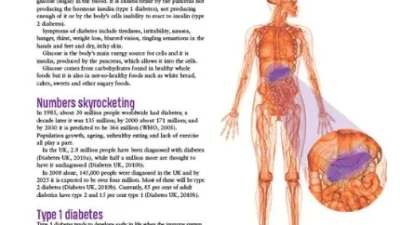Diabetes
Diabetes is a condition caused by the pancreas either not producing enough of the hormone insulin, or failing to produce any of it at all. Diabetes can also be caused when the body fails to react properly to insulin.
Type 1 diabetes
Type 1 diabetes is what’s called an autoimmune disease. This is where the body’s own immune system attacks certain cells in the body by mistake. In type 1 diabetes the immune system targets and destroys cells in the pancreas that produce insulin. This type of response involves a genetic predisposition (diabetes in the family) but is thought to be triggered by an environmental factor.
Various factors that trigger type 1 diabetes include viruses and some proteins found in cow’s milk. It is now widely accepted that early and adolescent exposure to cow’s milk (including infant formula) may be a trigger for type 1 diabetes in some people.
Find out more about why people develop type 1 diabetes and how to manage the condition better through diet here.
Type 2 diabetes
The vast majority of people with diabetes have type 2 diabetes. It’s the one that usually develops in adults and is strongly linked to lifestyle and being overweight or obese. Fat around the tummy especially puts people at increased risk because it releases chemicals that can increase insulin resistance. Unhealthy diet and lifestyle tend to cause weight gain but even if you don’t carry much extra weight, your body might be suffering the consequences. That’s because excess fat doesn’t just get stored under the skin but also in muscle and liver cells where it interferes with sugar metabolism and makes insulin unable to do its job.
Type 2 diabetes used to occur mostly in people over the age of 40, but it now affects people at a much younger age because of soaring rates of childhood obesity.
If current trends continue then in 2035, the NHS could be spending nearly a fifth of its entire budget on treating diabetes.
Unhealthy diets, high in animal fat (mainly from meat, dairy and eggs), cholesterol, sugar and processed food and lack of physical exercise are largely to blame for the diabetes epidemic. Meat consumption is linked to type 2 diabetes, whereas vegetarians and vegans are at a much lower risk. Moreover, animal products in general contribute to weight gain because they contain considerable amounts of fat, too much protein and no fibre. On the other hand, vegans are much more likely to be a healthy weight.
However, even if you have diabetes, you can significantly improve your health or even reverse the condition through a wholesome vegan diet. This means cutting out meat and dairy while eating more fruit, vegetables, wholegrains, pulses, nuts and seeds. See our success stories here.
For practical help with changing your diet to one that can help treat your diabetes, see our guide: The Big-D: Defeating Diabetes with the D-Diet.
See the health research on diabetes.
Find out what you need to eat each day if you’re diabetic here – page 15 – and for sample menus see page 26.






